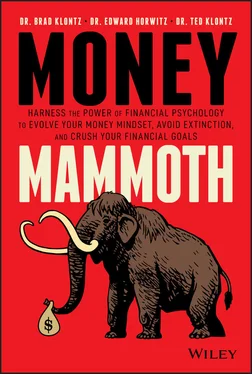Now think in terms of how your parents raised you around money. How was money handled in your home? How was it talked about? Did your parents agree about financial matters? Was money a topic of disagreement or conflict, or was it avoided altogether? What did your parents teach you about money, either overtly through instruction or by example?
When you take the time to explore your parents' experiences around money, you will make better sense of your own financial beliefs and decisions. As a child, you watched them closely. They created the universe in which you were raised; they created the initial structure on which you built your money mindset. Their beliefs about money have had a powerful impact on your own financial psychology—for better or worse.
As you think about your parents, their relationship with money, and what you learned, what feelings emerge? Our relationship with our parents is complicated, made up of a mixed bag of feelings and experiences over the years. Due to the nature of our species, we rely on the care, feeding, and protection of our parents longer than any other animal. As a result, we are more influenced by our parents than any other species. This is also where we get most of our socialization—how we make sense of relationships, our sense of self, and the various roles we play. For better or worse, you entered the world as the socialized and behavioral result of what you saw your parents say and do when you were very young. Typically, by the age of 7, your personality, behaviors, and social beliefs are fairly well cast.
When it comes to our beliefs and behaviors about money, research has supported a similar pattern of learning. What we see, hear, and overhear about money and relationships can influence us for our entire lives. These early childhood experiences create our money beliefs, which are hardwired into our subconscious. Our money beliefs drive our financial behaviors, and in many ways, determine our level of success. The subconscious representation of your financial beliefs, which greatly influences your money behaviors, decisions, and relationships, is known as Money Scripts ®. They are what informs our day-to-day interactions, decisions, discussions, relationships, filters, and behaviors regarding all things financial.
Since Money Scripts ®are so integral to our financial outcomes, it makes sense to know as much as we can about them. We dedicate Chapter 9to understanding and assessing your Money Scripts ®. For now, we are going to explore what roles your parents played in shaping your money beliefs.
Essentially, it could be fair to blame your financial problems, and possibly your relationship problems, on your parents. Most likely your financial beliefs and behaviors have sprung directly from your experiences in your childhood. Of course, you are ultimately responsible for your behaviors, but the fact is, your financial behaviors are rooted in your Money Scripts ®. Research on Money Scripts ®and their influence on financial outcomes is one of the fastest-growing areas of research in financial psychology. Financial professionals realize that understanding financial behavior is the future of helping clients with their financial needs.
BECOME YOUR OWN ANTHROPOLOGIST
Anthropology is the study of human societies and cultures and is a fascinating field. In studying a culture, anthropologists often immerse themselves into the culture, spending months or years living among the inhabitants. There, they both participate in the culture and observe the inhabitants, looking for insights into people's behavior from a cultural perspective.
Since you probably can't afford to hire an anthropologist to live with your family for a year to study you, you need to do your own research. This is where interviewing your parents, siblings, and other family members can be so valuable. In this process, it is not uncommon to discover stories you have never heard. Sometimes these stories shed light on your parents' behaviors around money. Take the opportunity to interview your family members, asking some of the following questions:
What was it like for you growing up around money?
How was money handled by your parents?
What was it like for grandparents growing up?
How did you feel about your socioeconomic status?
What beliefs about money were passed down to you?
What were your biggest financial mistakes? Successes?
Do you have any memories that stand out?
Often, these prompts will start an extended dialogue about their money memories. This is a good opportunity for you to listen. Take the time to let them share their memories and experiences around money. You might want to record the conversation and/or take notes. After your interviews, take some time to see if you can see any patterns. Did you notice any recurring themes? What beliefs did they have about money? Did you notice any differences between the childhood experiences of your parents? How did this impact their relationship with money? Do you recognize any of these beliefs passed down to you? How did their upbringing impact the development of your relationship with money?
This type of study can be quite valuable and will give you tremendous insight into your own psychology of money. You might begin to better understand why your parents raised you the way they did. Your parents are as much a product of their parents and early environment as you are a product of yours. Keep in mind that your children are the next in line to inherit this family financial legacy. The great news is that it is not too late to make “edits” to your family legacy.
Having disposable income and using it to help friends and family can be a wonderful resource. Money can be used to help in times of opportunity, transition, or need. Financial support can be used to help loved ones with a down payment for a first home, education, weddings, moving expenses, or starting a business. Having parents or other family members there to help can provide a deep sense of safety, security, and confidence, even if the help is never asked for or received. As a parent who is able to help financially, the opportunity to help can provide a tremendous feeling of importance, dependence, and connection to an older child or grandchild's life. We all know that early on in our lives, we have built very little financial savings, wealth, or independence. Having a parent there to give us a leg up with life's initial financial challenges can be a real benefit. Whether this help comes in the form of a gift or a loan, having support helps satisfy that deep, tribal need we have for connection.
But not all financial help is good. There are many circumstances in which financial help, or the promise of financial help, can hurt. For example, there are times when financial support enables a pattern of irresponsible financial behaviors, encouraging bad spending habits, a lack of saving, a lack of motivation, or other self-destructive behaviors. In our research, we refer to this as financial enabling and financial dependence , which is discussed in detail in Chapter 3.
Sometimes money is used within family systems to hurt or control. Sometimes the power money can have to create a connection in the lives of those close to us becomes so important that we use money to enable those feelings. This can lead to a pattern of financial enmeshment.
Financial enmeshment is a blurring of boundaries among family members around money. Our research has found that financial enmeshment occurs more commonly with higher income males, 1but it can afflict anyone. One example of financial enmeshment is when parents give children too much financial information or involve them inappropriately in adult financial matters. Common examples include:
Читать дальше












